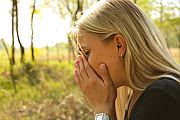Doctors predict a shorter but rougher stretch of coughing, sneezing, and wheezing
FRIDAY, April 17, 2015 (HealthDay News) — Experts are predicting that this allergy season may be one of the worst in years.
After a long, cold, wet winter, trees and flowers all seem to be blooming at once, and that means a sudden, big burst of all different types of pollen at the same time. Some experts are even predicting a “pollen vortex.” However, because the pollen season started later, it’s likely to be shorter, Joseph Leija, M.D., an allergist with the Loyola University Health System’s Gottleib Memorial Hospital in Chicago, told HealthDay. Leija has also been in charge of measuring the Midwest’s official pollen count for the U.S. National Allergy Bureau for the past two decades.
Beth Corn, M.D., director of Clinical Immunology Faculty Practice Associates at Mount Sinai Hospital in New York City, told HealthDay that it’s difficult to quantify from year-to-year exactly how bad an allergy season might be, particularly from a patient’s perspective. “Allergy season was bad last year, and it will be bad this year. People are very symptomatic now. But, remember, up until last week, we were still in winter coats in New York. People are noticing the stark contrast. Things have abruptly changed and people notice it,” she said.
The cities hit hardest by rough weather this winter may not see the worst of allergy season, according to the Asthma and Allergy Foundation’s Top Five Spring Allergy Capitals list. To make the allergy capitals list, a city has to have higher than average pollen counts along with higher than average medication use. The top five cities for 2015 are: Jackson, Miss.; Louisville; Oklahoma City; and Memphis and Knoxville, Tenn.
Copyright © 2015 HealthDay. All rights reserved.








